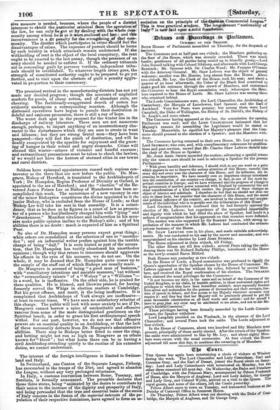Seldom have episcopal appointments caused such copious con- troversy as
the three that are now before the public. Dr. Mus- grave, Bishop of Hereford, is translated to the Archbishopric of York ; Dr. Hampden, Regius Professor of Divinity at Oxford, is appointed to the see of Hereford ; and the " election " of the Re- verend James Prince Lee as Bishop of Manchester has been ac- complished this week. The occurrence of a new vacancy in one of the minor Bishoprics constitutes the divine appointed to it the junior Bishop, who is excluded from the House of Lords ; so that -Bishop Lee will take his seat in that assembly. It is a coinci- dence, that as he does so he figures in a court of law as prosecu- tor of a person who has libellously charged him with "lying" and "drunkenness." Manifest virulence and indiscretion in his accu- sers make public opinion incline to the Bishop's side; and of his abilities there is no doubt : much is expected of him as a Spiritual Peer.
So also of Dr. Hampden many persons expect great things ; while others are scandalized at the selection of one so " unortho- dox "; and an influential writer prefers against him the terrible charge of being " dull." It is even hinted as part of the accusa- tion, that Dr. Hampden has tacitly abandoned his unorthodox opinions ; though why that return to innocence should aggravate his offence in the eyes of his accusers, we do not see. On the "whole, it may be deemed that Dr. Hampden quite comes up to -the sample of the stuff out of which Bishops are usually made.
Dr. Musgrave is accused of being " a good man of business," with "conciliatory intentions and amiable manners," but without the " extraordinary talents " of a " Wolsey" or a " Williams "- in a word, he is inoffensive. On the other side, be is praised for these qualities. He is blamed, and likewise praised, for having formerly served the Whigs in election matters at Cambridge. But his great offence, and merit, is the being inoffensive. It is complained that Archbishops of York always are inoffensive— at least in recent times. We have seen no satisfactory rebutter of this charge. The public will look with some anxiety to see if Dr. Musgrave cannot borrow a spice of uncharitable and offensive rancour from some of the more distinguished gentlemen on the "Spiritual bench, in order to grace his first archiepiscopal speech withal. For our part, however, we do not see that offensive powers are an essential quality in an Archbishop, or that the lack of these necessarily detracts from Dr. Musgrave's administrative abilities. There may be Bishops better fitted to enter the ring, and betting might not run so high on Musgrave as on others known for " blood" ; but what harm there can be in having a civil Archbishop attending quietly to the routine of his extensive duties, we cannot understand.


























 Previous page
Previous page